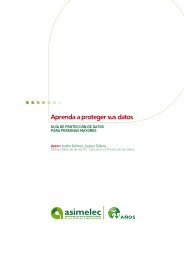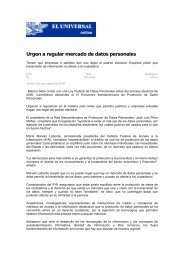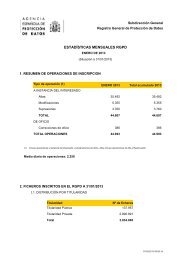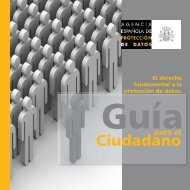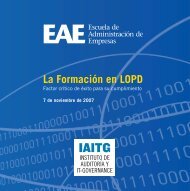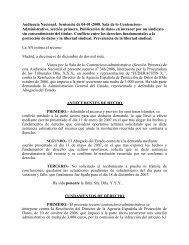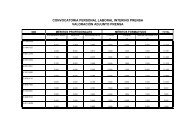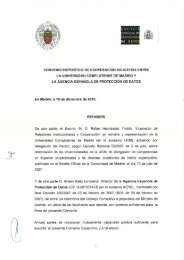access to public information and personal data protection 1 table of ...
access to public information and personal data protection 1 table of ...
access to public information and personal data protection 1 table of ...
Create successful ePaper yourself
Turn your PDF publications into a flip-book with our unique Google optimized e-Paper software.
ACCESS TO PUBLIC INFORMATIONAND PERSONAL DATA PROTECTIONHuixquilucan (Mexico State), 4 th November 2005laws do not provide mechanisms <strong>to</strong> reinforce <strong>access</strong> <strong>to</strong> <strong>information</strong>, while inothers, the government creates obstacles or takes advantage <strong>of</strong> legal vacuums<strong>to</strong> avoid having <strong>to</strong> make the <strong>information</strong> in its possession <strong>public</strong>.The fifth relevant principle refers <strong>to</strong> the provision <strong>of</strong> <strong>information</strong> free <strong>of</strong> cost, orthe establishment <strong>of</strong> costs that make requests for <strong>information</strong> affordable by all. Ingeneral, this implies that the government body must keep the cost <strong>of</strong> reproducingthe <strong>information</strong> <strong>to</strong> a minimum, even when such cost may be passed on <strong>to</strong> theparty requesting it. Many other fac<strong>to</strong>rs must also be included in laws governing<strong>access</strong> <strong>to</strong> <strong>public</strong> <strong>information</strong>. Penalties for non-compliance, for example, is onesuch fac<strong>to</strong>r, although the existing legislation varies considerably in this respect.A sixth principle has <strong>to</strong> do with finding the institutional structure that envisagesthe persons responsible for h<strong>and</strong>ling requests for <strong>access</strong> within the governmentbody <strong>and</strong> mechanisms for revising the decisions taken by such persons. Thesemechanisms may be implemented either in the government agency itself orthrough a body entrusted with overseeing observance <strong>of</strong> the law. The latter isone <strong>of</strong> the most solid principles on which effective <strong>access</strong> <strong>to</strong> <strong>public</strong> <strong>information</strong> inthe possession <strong>of</strong> the State is based.Furthermore, a key issue <strong>to</strong> be considered <strong>and</strong> for which there is no preestablishedprinciple is the scope <strong>of</strong> application <strong>of</strong> the law. The majority <strong>of</strong>legislation on this matter stipulates that federal or national government agenciesare subjects with obligations under the law, including those operating indecentralised regimes. Other countries establish a general law that governs thisright over practically all the <strong>public</strong> bodies <strong>of</strong> the State, both at national <strong>and</strong> locallevels. On the other h<strong>and</strong>, countries with unitary governments will probably se<strong>to</strong>ut generally or nationally applicable laws that govern <strong>access</strong> <strong>to</strong> <strong>information</strong> inpractically every government body. The essential point here is that citizens havea government that is open in matters <strong>of</strong> <strong>access</strong> <strong>to</strong> <strong>information</strong>. That is, regardless<strong>of</strong> the type <strong>of</strong> government <strong>of</strong> the country in question, citizens have the legalmechanisms <strong>to</strong> enable them <strong>access</strong> <strong>to</strong> the <strong>public</strong> <strong>information</strong> held by theirgovernment, whether this is national, federal or local. Perhaps a federal stateshould have more than one law on <strong>access</strong> <strong>to</strong> <strong>information</strong> <strong>to</strong> be able <strong>to</strong> ensure<strong>access</strong> <strong>to</strong> all government documents. But is must be stressed that <strong>access</strong> <strong>to</strong><strong>information</strong> is a fundamental right that guarantees the true exercise <strong>of</strong>democracy, <strong>and</strong> the type <strong>of</strong> government should not be an obstacle in making thisright effective.6



